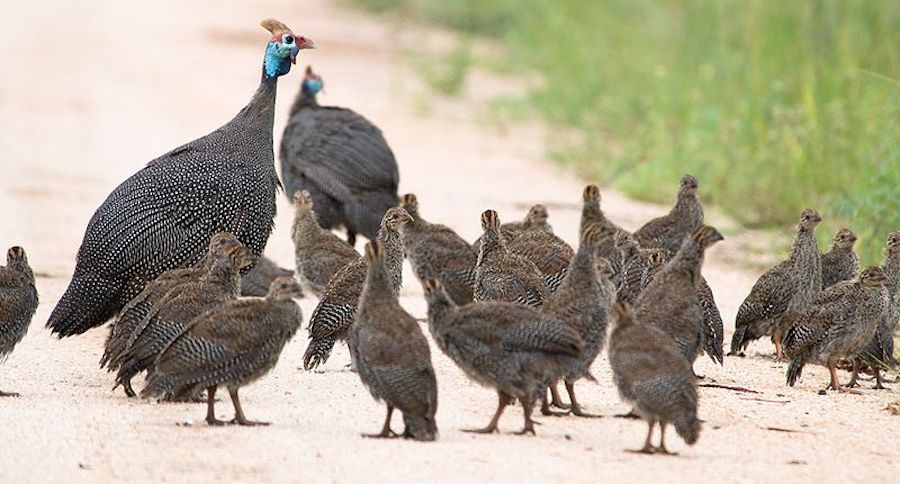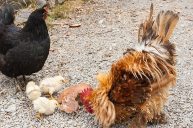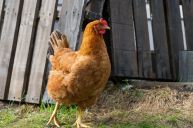Guineas are a strange looking bird. There are three basic colors (white-breasted, black and helmeted) and they're coloring is typically what people talk about when they first meet them! That and how noisy they are. They are related to pheasants, turkeys, and other game fowl.
My neighbor has Guineas to alert him when there are predators bothering his backyard flock. They are loud and their noise really carries so my advice is only to consider Guinea hens if your neighbors live a good distance from you.
I'll consider Guineas when our roosters start to get old and are no longer effective at keeping the chickens safe.
The Happy Chicken Coop tells us,
"They are great at ridding your yard of ticks, insects, small snakes, and rodents; outstanding pest patrol. In fact, just the call alone of the Guinea fowl deters rodents from the area."
History
https://www.instagram.com/p/Bwgz_v8lLLT/
The Happy Chicken Coop expert also shares some great facts about how Guineas ended up here!
- History buffs suggest that Guinea fowl were known as far back as ancient Greece around the 5thcentury BC.
- The Romans brought them back from their African campaigns and tried to domesticate them.
- They were semi-successful in this venture, raising them on farms.
Romans were able to raise them but never really tame them. I'm not at all stunned to hear this as they don't like to be held at all.
Guineas were first introduced in Europe back in the 1400s and made their way to America with the early settlers.
Disposition, Diet and Eggs
https://www.instagram.com/p/Bw3ub2RH5zj/
Guineas lay a small, brown, pointy egg with a very hard shell. I don't know this from personal experience but Guinea eggs are supposed to taste just like chicken eggs.
They are very social with other Guineas and where one goes, they all go. This is very obvious with my neighbor's flock as they're always running around together. If one gets lost it will call out until the flock comes to find it.
Staff note: They can co-exist with chickens, but IF you decide to include a male Guinea fowl in your flock you should not have roosters. They can become very territorial and will run off any roosters in your flock. They can also be bullies to smaller birds and the pecking order can become very brutal. Try raising them with chicks if you can.
The feed should be mash or crumbles, pelleted feed is not recommended.
Myth busting
https://www.instagram.com/p/Bw3GPEoFCEx/
Some folks think it's fine to keep Guineas in small coop areas or even in cages. They are flock birds, still more wild than domesticated, and will always find security in numbers, functioning best in a large group that is free to roam. Free-ranging is the answer for these birds.
This video goes into a lot of detail with facts you'll want to consider before bringing him a few Guinea hens.
Raising Guinea fowl can be a lot of fun but make sure you live on a small farm and they can free range. Adult Guineas are loud and it's no joke!
In my mind, the biggest benefit is pest control. Ticks can carry terrible diseases like Lyme disease and Guineas will eat ticks of all kinds! The Deer tick is regional and Guineas will eat those too!
My point of view is to stick to female Guineas if you want to add them to your backyard flock of chickens. The aggressive male behavior is real and having roosters and male Guineas together will make things complicated. Otherwise, the Guineas are known to be low maintenance! You want to raise Guineas and enjoy the experience without a lot of stress.
Baby Guineas are known as keets vs. chicks and once the eggs hatch the Guineas are off and running again! You will likely need a broody hen to sit on the Guinea eggs. If you leave the day-old keets with a Guinea hen they may simply not make it. The Guinea Keets are adorable!
What do you think about Guinea hens now? Do you have them in your backyard flock? Please leave a comment below!
WATCH NOW: What is the most effective and natural tick control in your yard?




